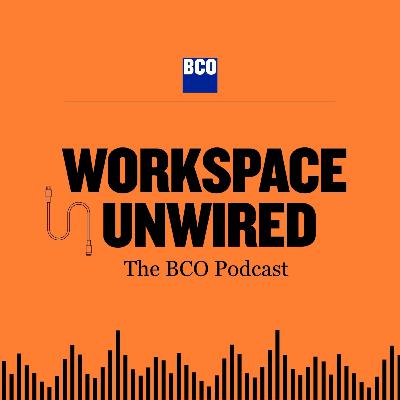Discover Workspace Unwired
Workspace Unwired

Workspace Unwired
Author: British Council for Offices
Subscribed: 217Played: 1,049Subscribe
Share
© British Council for Offices
Description
Workspace Unwired is a fresh new podcast brought to you by BCO in which we delve into everything workspace and work places, from the people that make it happen, the places that it helps create, the planet that we need to protect as we redesign, retrofit and deliver fresh workspaces and the policies and practices that are impacting the sector today and tomorrow.
32 Episodes
Reverse
In the latest episode of Talking Shop, Clare Bailey, author of the BCO Research report, 'Affordable Workspace: A Solution, Not a Problem' (undertaken by Savills) speaks to NextGen's Hannah Buxton.
"Productivity is up, but innovation is down." The two discuss affordable workspace at length, SME's, building reuse, social sustainability, community and the recent workplace challenges Gen Z and Millennials have faced #remoteworking
In a varied discussion and debate, Ken Giannini (Director, MCM) and one of NextGen's Rising Stars Yohance Harper (Associate Partner, Quadrant) chat about the work they're doing, and share their thoughts on architecture, sustainability, mentoring and purpose. They also share all things inspiration, career journeys and future industry trends.
“As a young architect, a previous boss told me to always challenge solutions from the past” – Ken Giannini
Yohance reminds us that great architecture should make you feel something and stresses the importance of anything that helps you to grow - especially chatting to industry peers - you just never know what could come from mingling and #networking.
“Buildings need to be platforms for partnerships.” If you look at your career, what would you like to leave behind and be known for? For Yohance, it’s people and places.
#bconextgen #talkingshop
In the first episode of Talking Shop with the NextGen: Gillian Stewart (BCO Scotland's Chair and MLA Director) speaks to Savannah de Savary, Founder & CEO of Built_ID + Forbes 30 under 30 Social Entrepreneur and one of BCO Nextgen’s PropTech Company of the Year Award winners. They discuss the commercial real estate industry at large, PropTech, and how we get more young people a step up the construction career ladder and more.
SHOW LESSCOVID-19 has changed the way we work. For the first time ever, the nation is working from home en masse. Office desks have been swapped for kitchen tables, meetings for video calls and suits for sweatpants. Already, this shift is posing new questions about the future of work and, in particular, the office.
Will working from home become the ‘new normal’? If so many people can do their jobs from home, do firms really need to take out so much office space? How can the ‘future office’ learn from our present situation?
Richard Kauntze, Chief Executive of the BCO, speaks with Paul Patenall, BCO President and Projects Director at U+I.
Receive the BCO newsletter and stay up to date with future #bcoevents / webinars:
Visit http://www.bco.org.uk/Events/Events.aspx
To what extent will working from home become the new normal? Richard Kauntze, Chief Executive of the BCO speaks with BCO Research Chair, Elaine Rossall, UK head of offices research at JLL about how we might work post-Covid-19, and the pandemic’s impact on infrastructure and the office sector.
To what extent will working from home become the new normal? Richard Kauntze, Chief Executive of the BCO speaks with 2017/18 BCO President, and founder of Make Architects, Ken Shuttleworth about how workplace designs may change as a result of Covid-19, whether there will still be an appetite for major workplace projects and the economic shock's impact on the industry.
Shuttleworth joined Foster and Partners in 1986 and worked on some of the world's most iconic buildings, including The Hongkong and Shanghai Banking Corporation’s headquarters, 30 St Mary Axe ('The Gherkin’) and City Hall.
He left Foster and Partners to set up his own practice, Make Architects, in 2004. The practice has completed a number of renowned buildings, such as the City of London Information Centre, the 55 Baker Street office development and the Olympic Park’s Copper Box Arena.
"I have not had a desk in 25 years." In this episode of The New Normal, BCO's Chief Exec speaks to Cushman & Wakefield's Head of Occupier Business Performance, Despina Katsikakis about the impact of the lockdown on the wellbeing and productivity of employees, how this period of working from home will impact the future of work and how the demands and expectations of occupiers might be changed by COVID-19.
Head of Real Estate at PwC & Board Member at British Council for Offices, Chris Richmond discusses the shift to mass working from home, and what he thinks workers most miss out on by not being in an office.
How will COVID-19 impact the relationship between tenants and landlords? In the latest episode, Richard Kauntze discusses this and more with head of Savills UK and European commercial property research team, Mat Oakley. Mat specialises in the office, leisure and retail sectors.
Mat's experience includes work on a variety of topics including various office markets, the impact of major infrastructure developments, advising on tenant mix for both in and out-of-town retail and leisure developments, environmental impact analyses and assessing demand for and master planning leisure developments.
As City Planning Officer for the City of London, Peter Rees led the planning and regeneration of this world’s business and financial centre from 1985 to 2014. Today, Peter is Professor of Places and City Planning at UCL. He lectures internationally and advises developers and cities around the world on urban planning and design.
Peter is a founder member and director of the British Council for Offices and received the President’s Award in 2003 for “presiding over one of the most extensive periods of redevelopment in the City’s long history.”
Famously, Peter preferred to keep the City as a place just ‘for business’. In this episode, Kauntze asks whether he thinks this could change in the coming years, perhaps as a result of COVID-19. Planning in The City is covered throughout the episode, as well as what office designers can do to make their office stand out, and give people a reason to not just work from home.
Bill Price is a director at WSP and a structural engineer by background. His career has included buildings across many sectors usually delivering multidisciplinary engineering services. He was responsible for the early design development stages of the Shard and associated with all the projects at London Bridge helping to raise the profile of tall buildings in London especially around transport nodes.
Since 2012 Bill has been closely associated with the delivery and thought leadership around rail overbuild. Bill authored and led the production of the WSP papers ‘Building our way out of a crisis’, ‘Out of Thin Air’ and ‘Out of Thin Air – one year on’. He has presented on the topic at many conferences and events in the UK, continental Europe and Australia.
Bill has been a long term supporter of the BCO and led the conference technical tour programmes for New York, Madrid, Chicago, London and the recently postponed Toronto. In 2016 Bill co-edited ‘A Strategic Design Guide to Tall Buildings’ for the British Council for Offices and published by the RIBA.
Clare Ashmore has been at Parkeray for 20 years, a main board member for 14 years and was promoted to Group Board | Chief Operating Officer in January of this year. Her role covers all aspects of that of a COO (spinning plates) but has a keen drive on wellbeing, brand and ethos experience. Clare has always focused on developing young people within our industry being on one of the first committees for Young Entrepreneurs in Property from 2002 and as board member at Women in Property, ran Schools Roadshows and Business Breakfasts with London Schools giving students a glimpse of the property industry. Clare continues as Chair of the Mentoring Committee within the BCO of which she has been a board member for the past 9 years, supporting the #BCONextGen.
Paul Finch is Programme Director of the World Architecture Festival (WAF) and Editorial Director of The Architectural Review/Architects’ Journal. He started professional life as a journalist in the early 1970s. He became Deputy Editor of Estates Times (now Property Week), and subsequently edited Building Design, Architects’ Journal and Architectural Review, where he launched WAF in 2008.
He has been co-editor of Planning in London since 1994. He was a founder commissioner at CABE (Commission for Architecture & the Built Environment) in 1999, chaired its design review and regional panels, subsequently chairing its London Olympics design panel from 2005 to 2012. He became chair in 2010, overseeing its merger in 2011 with the Design Council, where he was deputy chair for three years.
He holds an honorary doctorate from the University of Westminster and honorary fellowships from University College London and the Royal Institute of British Architects .He is an honorary member of the British Council for Offices and the Architectural Association. He was awarded an OBE for services to architecture in 2002.
We hear from Lindsey Barrett, Chair of the London NextGen Committee on the legal impacts COVID-19 is having on the market and what we might expect from corporate occupiers. We also cover her ambitions for the NextGen, advice for today's grads and what could be done to improve diversity in the CRE sector.
In the final episode of the New Normal series, we hear from Danny Parmar, Chair of the BCO Midlands and East Anglia region. Danny is Business Development Manager with Overbury, with a major focus on Birmingham and Cambridge. In 2015, Danny built a BCO sub-chapter from scratch in Cambridge to harness its vibrant office sector.
Sir Craig Oliver was the former British Prime Minister, David Cameron’s Director of Politics and Communications for over six years, responsible for the Government’s strategy and messaging. During that time he was Director of Communications on a number of political campaign teams, including the 2015 General Election (winning an unexpected overall majority).
His day-to-day work in this role included a radical overhaul of government communications, making them fit for the digital age. In this 'New Normal' special, BCO's Chief Exec, Richard Kauntze and Sir Craig Oliver discuss the UK and International Governments' handling of the Covid-19 crisis so far, Brexit, and the longer-term impact of the Covid-19 crisis.
"Big businesses and small have been helpful, ingenious, inventive, innovative, they have come up with lots of solutions” – Martin Vander Weyer, Spectator business editor, discusses the economy, Brexit and capitalism in the time of COVID-19 in our latest #NewNormal
The United States is Britain’s closest ally. Richard Kauntze asks Sir Christopher Meyer how he thinks it currently stands and whether he thinks Trump will be re-elected for a second term this November.
Richard also says that following Britain’s departure from the EU, there has been much talk of the benefits of a comprehensive trade deal with the US, but America fights hard in trade negotiations and asks Sir Christopher what he thinks the chances of a good deal are for both sides, and much much more in this not-to-be-missed 3rd New Normal Special on diplomacy and international relations.
In this episode of the BCO’s Workspace Unwired chief executive Samantha McClary is in discussion with the co-founder of Muslims in Real Estate and Cushman & Wakefieldsurveyor Yusuf Javaid to talk about the importance of delivering spaces that work for everyone, about how multi-use rooms are just as important as multi-faith rooms and how real estate as the potential to provide endless opportunities to everyone.Javaid shares his story of setting up Muslims in Real Estate, a network born out of the lack of Muslim representation in the real estate sector but that has grown into being an enabler of true inclusivity in the places and spaces we deliver.He shares his ambitions on how he wants to make sure MiRE to has a place at the table, so it can bring about tangible change in the industry and showcase how brilliant real estate can be when it has brilliant people in it and – spoiler alert – how you can find those brilliant people when you become a more inclusive, diverse and equitable sector.It is a fascinating listen that will almost certainly inspire you to think about the important role our spaces should and can play in driving inclusivity.If you'd like to find out more about Muslims in Real Estate, connect with the group on LinkedIn: https://www.linkedin.com/company/muslims-in-real-estate/
In this episode of Workspace Unwired Mark Bourgeois, chief executive of the Government Property Agency, sits down with BCO CEO Samantha McClary to talk about the transformationof the government estate, the work the agency is doing to deliver value and the challenges and opportunities he is discovering as the team works to right-size the estate.Bourgeois also shares his love for leadership and how a background in retail gave him the perfect grounding for a new career in place, which is - as we all know - what real estate is really all about.All that and so much more in your latest episode of Workspace Unwired.























